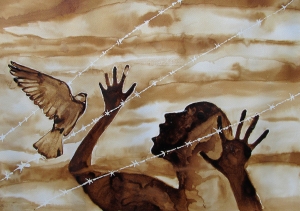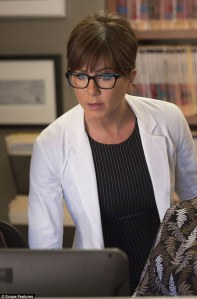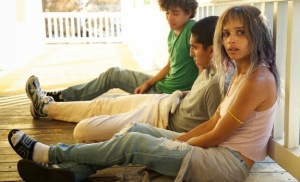What Hollywood’s obsession with depicting mentally ill characters as “kooky” tells us about our own collective denial.
By E.F Nicholson
Once again, we have another movie about wacky young adults suffering from mental illness. Often in Hollywood people labelled mentally ill are depicted in one of three ways:
1) Disturbed and violent
2) Crazy, but brilliant.
3) Damaged, but rebellious or wacky.
In this movie we get number three. The Road Within, written and directed by Glen Wells, is showing us once again that just because you’re a little nuts doesn’t mean you can’t take a road trip and learn valuable life lessons, fall in love, and reconcile your broken and wounded relationships of the past. The sanitisation of the serious issues faced by those deemed mentally ill and the “kookifying” of such chronic problems seems to be an expertise Hollywood has become particularly good at. Past successes in the celebration of zany antics of the “mucho loco” include Girl Interrupted, The Dream Team, It’s Kind of a Funny Story, etc.
Judging from the trailer (in this version of the tried and tested formula), the lead character has everyone’s favourite and hilarious mental illness, Tourette’s syndrome (excluding fear of pickles, as featured on Maury). Tourette’s, unlike plain old boring psychosis or manic depression, makes for great cinematic wackiness. The trailer shows, in the first few seconds, the character struggling to control his “ticks,” as we see him “ticking off” at church and his poor family looking at him like, “Cut it out, boy. You’re embarrassing us in front our Republican WASP congregation.” This life-long mental health problem has seemingly only now become apparent to the father as he recoils with embarrassment.
We then see the psychiatrist, who has the certain glasses which are Hollywood code for “she be brainy.” The Doc thinks he should room with a guy just as wacky, but in a different type of mental cockamamie (as double Tourette’s could get tedious). So the bunk buddy, Dev Patel, has chronic OCD, another condition that makes for serious chuckles and overall zaniness.“Take your shoes off,” he yells, letting us all know straight away “he be crazy,” as well as sounding like my Spanish mother-in–law every time I enter her flat. “Getting these two to share room in an expensive private hospital will be a great start to the life lesson both these vulnerable mental patients need to soon learn,” thinks the brainy brain doctor. Wow! What will happen when these two oddballs room together? Well, if you were thinking of an awkward and more complicated Brokeback Mountain, you would be wrong. Enter the Lisa Bonet of Generation Y, Zoe Kravitz, who’s surely been landing major movie roles based solely on her talent and nothing to do with her uber-famous dad and mum.
Zoe is the cynical but uber-cool anorexic who will challenge our main character to be more than just his illness, and possibly blow him at some point in the movie (we probably won’t get to see how his ticking impacts this). She has an eating disorder, but not the one that makes her look like Skelator on meth walking around with a drip, rather one that makes her the skinny hot type. Which is an awesome message to send girls with eating disorders: “Look how hot she is and she has what I have.” So Zoe asks Tourettehead if he could go one place, where would it be? Of course he can’t say your vagina or Burger King, as it spoils the narrative, so he says something that will need her to use the jingling stolen car keys she holds up, as stealing the resident psychiatrist’s car keys is shit easy; she must always leave them around unattended while dealing with mentally ill people. Zoe confirms with this theft her cool street cred, as breaking the law to learn life lessons means you don’t have to go to jail in the USA.
So off they embark, Tick man, OCD dude, and hot eating disorder chick, and we just know the adventure has only just begun. As you can imagine, they laugh, they scream, they cry, they kiss, they possibly group spoon, and most importantly, they “learn.” All this shows us, the audience, that of all the roads we travel, the one that matters most is…… drum roll………… “the road within.” Wow, that shit be deep. How it ends, I don’t know, although I imagine Zoe murdering both of them and then killing herself, but I think that may be too French new wave for the audience. My bet is a sad but touching ending that wraps itself up neatly and leaves us feeling all warmed and fuzzed.
 Having spent eight years visiting my brother in psych wards both locked and open, and having even been admitted to a psych ward myself, I do have a decent amount of experience in what goes on and who actually inhabits these facilities. Although generally they are mega–depressing, there are people there who have interesting and heroic stories, but nothing like these characters we see in the trailer, as movies about mental illness don’t need to have a “One Flew Over the Cuckoo’s Nest” level of bleakness to be realistic. Yet, to make it truly real and relatable to the actual experience, it has to be grounded in some kind of reality of what this phenomen of pain looks and feels like. The moment kookiness and zaniness enters any film about mental illness, it’s there you straight away know this is going to be another giant dump on reality. Psych wards are not repository of life’s wacky characters. They are filled with troubled, disturbed and very wounded humans. They are lonely, boring and tediously dull places where time is mostly filled with smoking cigarettes, watching TV, and other forms of coerced drug-induced vegetation. Of course, reality makes for shitty movies, I know.
Having spent eight years visiting my brother in psych wards both locked and open, and having even been admitted to a psych ward myself, I do have a decent amount of experience in what goes on and who actually inhabits these facilities. Although generally they are mega–depressing, there are people there who have interesting and heroic stories, but nothing like these characters we see in the trailer, as movies about mental illness don’t need to have a “One Flew Over the Cuckoo’s Nest” level of bleakness to be realistic. Yet, to make it truly real and relatable to the actual experience, it has to be grounded in some kind of reality of what this phenomen of pain looks and feels like. The moment kookiness and zaniness enters any film about mental illness, it’s there you straight away know this is going to be another giant dump on reality. Psych wards are not repository of life’s wacky characters. They are filled with troubled, disturbed and very wounded humans. They are lonely, boring and tediously dull places where time is mostly filled with smoking cigarettes, watching TV, and other forms of coerced drug-induced vegetation. Of course, reality makes for shitty movies, I know.
Movies such as these do those who suffer from mental pain a massive injustice and trivialise the very real issues they deal with. I know I haven’t seen it, but going just by the trailer it seems to be another predictable and cliché production. (If Gren Wells’s last movie was anything to go by, my prediction of its badness will be accurate. A Little Bit of Heaven was a cinematic whole lot of hell. It was a feel-good chick flick about cancer, so bad, so so gooey and so utterly nauseating it made you want the protagonist’s cancer to hurry up and kill her.) From a business point of view it makes sense. Real depictions of the complexity and torment of mental illness do not draw people to the box office. Neat stories that pull at heart strings but leave the viewer feeling good make more money, but they remove people from the truth of what really goes on.
 Mental illness is part of our collective shadow. What we avoid in others we avoid within ourselves. Hollywood churns shit movies like this out all the time as a part of the bandage of denial we crave. The depression, psychosis, chronic anxiety and fear that grips and cripples people’s lives is a sign of deeper malaise in our society. The anguish and suffering of those considered mentally ill is the canary in the coal mine of the kind of society we have become. We are not separate beings, divorced and cut off from each other, as much as it may feel like that. The pain of others, the mental breakdown of many, it’s ours. It belongs to all of us. By sanitising it, watering it down, and packaging it as zany, we avoid the inevitable healing required. We stave off the deeper questions as to what it is about the way we live, the way we work and parent, the way our society is structured and set up, which produces so many wounded and broken people. Why do we have so many addicts, so many depressives, and so many unhappy humans? Let’s share stories about our broken lives, our haunted souls, our humanity and hope, but at least make them real and relevant, and make them part of the healing process, not part of its denial.
Mental illness is part of our collective shadow. What we avoid in others we avoid within ourselves. Hollywood churns shit movies like this out all the time as a part of the bandage of denial we crave. The depression, psychosis, chronic anxiety and fear that grips and cripples people’s lives is a sign of deeper malaise in our society. The anguish and suffering of those considered mentally ill is the canary in the coal mine of the kind of society we have become. We are not separate beings, divorced and cut off from each other, as much as it may feel like that. The pain of others, the mental breakdown of many, it’s ours. It belongs to all of us. By sanitising it, watering it down, and packaging it as zany, we avoid the inevitable healing required. We stave off the deeper questions as to what it is about the way we live, the way we work and parent, the way our society is structured and set up, which produces so many wounded and broken people. Why do we have so many addicts, so many depressives, and so many unhappy humans? Let’s share stories about our broken lives, our haunted souls, our humanity and hope, but at least make them real and relevant, and make them part of the healing process, not part of its denial.
Art taken from : http://therefugeeartproject.com/home/coffee-paintings/
Artist and Art by Alwy Fadhel
The images in this gallery are paintings made with instant coffee powder that has been diluted in water and then put to the page. The technique was initiated by an Iraqi detainee who had some knowledge of art and who liked to paint in his free time. Upon entering detention, he had no access to paints so he reached for whatever was at hand, in this case finding an alternative use for instant coffee. He then taught the technique to Alwy Fadhel, who became its chief exponent. Coffee painting has gained a life of its own inside the Villawood Detention Centre (Australia) and is now something of a tradition (a young Afghan asylum seekers has also begun to use the technique after Alwy’s example). The recourse to food as an artistic medium speaks to the ingenuity of detainees who have limited access to adequate materials and tools.
Alwy Fadhel has been detained for over 5 years—one of the longest running cases of detention. His works evoke the psychological hardships that detainees commonly face, including homesickness, anxiety, depression, and the trauma of witnessing other detainees commit acts of self-harm and suicide.



Hilarious take-down of a trash movie. If they ever read it, it would make the creators cringe as you reel off one trope after another without ever having ever seen the movie.
LikeLike
Yeah it goes to show how formulaic movies have become when you can do a somewhat accurate appraisal of movie just by its 2.30 min trailer. I did read some of the initial reviews of the movie itself which seemed to confirm the points in the article. Although there was strong performances the story took the all to predicable route one would expect. One reviewer rightly pointed out you can’t have it all ways, you can’t pick and choose when theirs traumas are good for laugh and when they are meant to touch your heart. That very process shows the contrived nature of it. To me you either make serious drama with some dark humour, or you just go all out dumb and dumber slap stick stupidity but you can’t have both. I think I might start a series title “Master of the obvious: 101 reasons the music industry and Hollywood are cultural turd factories” I would never run out of things to write about.
LikeLike
Brilliant post. Haha and yes an uber realistic morbid ending would be too French for Americans who remake foreign films because??? I love the point you make: “The anguish and suffering of those considered mentally ill is the canary in the coal mine of the kind of society we have become.” This sentiment doesn’t carry very far precisely because films– and other cultural junk lit like this– tend to emphasise that the illness belongs solely to the individual.
LikeLike
Thanks DCCB. Yeah its something I feel quite strongly about, that being depressed or anxious in response to the way we live, interact and are treated is reasonably understandable. Maybe its the super happy people are the ones who have the problem -haha.
LikeLiked by 2 people
I’ve always secretly believed that…
LikeLiked by 1 person
After working 15 years in Tokyo I bumped into a few people you’d place in the top .1% and it was interesting to me that they all seemed permanently dissatisfied, prone to aggression and on edge. Almost as if they had a mental dysfunction that, by pure happenstance, is an extremely beneficial attribute in the capitalist system. I called them dysfunctionally functional. It is also important to note that none of them where particularly clever and definitely not intellectual or prone to reflection. Ruthlessness is definitely a quality they all shared.
When I was young I believed that the best reason to want to climb up in society was the opportunity to mix with better, brighter and more interesting people (a shallow goal..). But I’ve found there’s a peak in the level of interesting conversation you can have with people somewhere around the middle class level. “Above” that and people seem to be narrow-minded, focused on their immediate requirements and not interested in expanding their knowledge of science, philosophy, geopolitics or anything else.
LikeLiked by 1 person
Hey HF, what you’re saying doesn’t surprise me. I haven’t had the fortune or misfortune to mix with that social stratosphere but I can imagine you must need to insulate yourself somewhat and develop all sort of weird coping mechanism to rationalise being an arsehole. The best of the best arseholes tend to be psychopathic or severe malignant narcissists enabling them not to give a shit either way. Thats said, I try remember even the word biggest arsehole was once someone little child and is as much worthy of my compassion as anyone else, maybe even more so.
LikeLiked by 1 person
Hi back TTM.net. I view the chance to interact with these people as a blessing. Like an amateur biologist whale watching. My burning goal in life is to fade out on my deathbed with the relief of a sense of complete understanding. It’s unrealistic but most goals are anyway.
My personal theory about these people, who I would call borderline sociopaths, is that at some age they bifurcated themselves into 2 people. One the inside is the innocent child they perceive themselves to be. Somewhere about 10-11 years old. And on the outside is a sort-of-bodyguard, public persona who protects that child. The outside bodyguard re-assures to the inner self, “I will do ANYTHING to protect you”, like a guardian or parent and so disassociates any immoral action they do as a necessary evil to protect that innocent child inside. “I’ll never let anyone hurt you. I will look after you.” seems to be their mantra and they regard everyone externally as threats or likely threats.The eternal paranoia of an overprotective parent. The twist is, the controlling body here is the immature inside. And as we know, there is nothing quite so cruel or as vicious as a child.
My “in” to these people is I challenged them and tried to interact with them without patronising or judging them. The master of this is Louis Theroux (http://en.wikipedia.org/wiki/Louis_Theroux) who can talk to vicious gang members, etc. and extract unbelievable openings from them with his manner. I’m not even close. He’s a master of interaction. Watch his docos. They’re all really great.
Anyway, I have a bunch of bitter-sweet anecdotes about my little journeys into the world of these people (mostly high finance US banking types and some stories are very weird. Sometimes the story double-backs on itself and reveals my own enormous error a la The Twilight Zone). To sing my own praises, I guess I could intrigue them long enough to get a brief insight before they shut the gate. The specifics I generally do in a giant verbal rant being too lazy to write it all down…
And you? A burnout like me forsooth?
LikeLike
This guy said it well………..“It is no measure of health to be well adjusted to a profoundly sick society.” – J.Krishnamurti
LikeLiked by 2 people